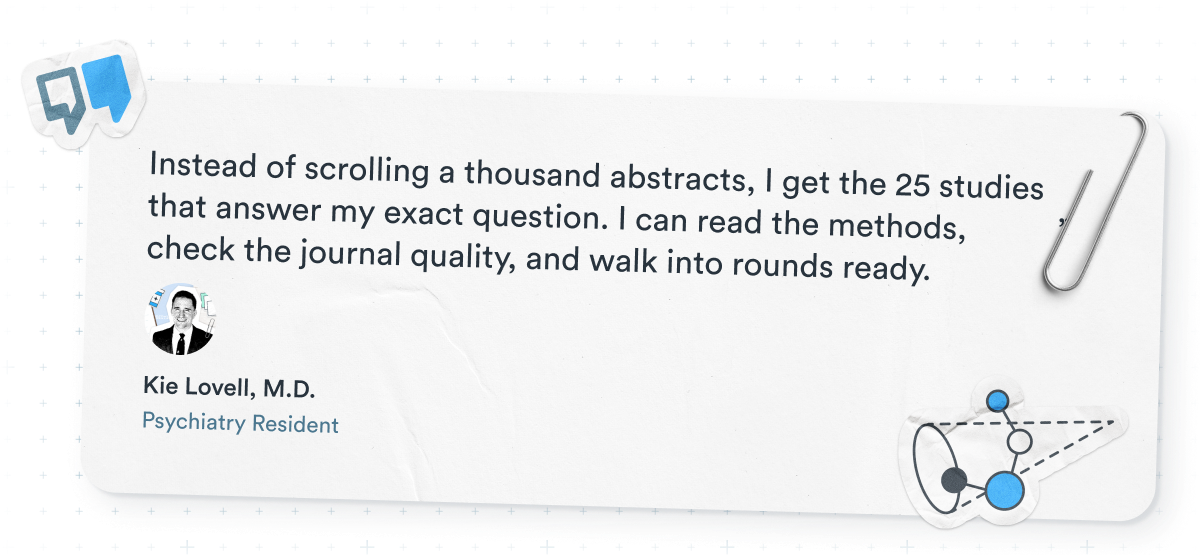
Where the Journey Began
Kie is a psychiatry resident based in the Washington, D.C. area. What drew him to this field of medicine was a deep commitment to people living with substance use disorders. Friends and family members had struggled, and he saw first-hand how the right care could change a life.
“They’re my people. When you watch someone regain control of their life, that’s as rewarding as work gets.”
Bringing Data to the Addiction Clinic
Residents work under attending supervision, so every treatment plan must be defended with current evidence. Traditional PubMed searches can return thousands of papers, making it nearly impossible to sift through them between consults. Kie turns to Consensus to narrow the noise and surface the studies that truly matter.

Rethinking a Complex Case
While rotating through a rehab unit, Kie worked with a patient who had both alcohol use disorder and cirrhosis. Historically, providers have been cautious about prescribing naltrexone in cases of liver disease, so the default approach would often be to avoid it — even though it can be an effective medication for alcohol use.
Kie used Consensus to better understand the current research on naltrexone’s safety in patients with compensated or moderately decompensated cirrhosis. The tool returned a targeted set of studies showing a range of perspectives, from supportive to cautionary, with summaries and details organized by journal quality and study size.
The findings suggested that naltrexone may still be appropriate in many cases, depending on severity. Kie brought this evidence to his attending team, where it contributed to a treatment discussion. With support from current research, the team decided to proceed with naltrexone, giving the patient access to a potentially valuable option for reducing alcohol use and preventing further liver damage.

How Kie Uses Consensus to Work Smarter
As a psychiatry resident, Kie uses Consensus to streamline clinical research and support evidence-based discussions with his team. It doesn’t replace clinical judgment — but it helps him work more efficiently and come to rounds prepared.
1. Exploring treatment options
When considering off-label options like topiramate for alcohol use disorder, Kie used Consensus to compare it with standard treatments like naltrexone. Instead of searching PubMed and reviewing dozens of abstracts, he used Consensus to surface relevant studies quickly and review their key findings before making a case to his team.
2. Preparing for presentations
Residents often lead teaching sessions and present clinical cases. Kie uses Consensus to ask targeted questions and gather citations to include in his slides. It allows him to build evidence-based presentations more efficiently and pull research that’s directly relevant to what he’s teaching.
3. Supporting clinical decisions on the ward
In situations where a treatment decision requires justification — such as using a medication in patients with comorbid conditions — Kie turns to Consensus to gather relevant studies. He then shares that research with his attendings to support team discussions and contribute to a shared understanding of current best practices.
4. Identifying strong research questions
Kie is also involved in research, including early explorations into biomarkers for psychiatric conditions. Consensus helps him figure out what’s already been studied and where knowledge gaps still exist. That lets him refine his research questions before investing significant time pursuing a study that may already have answers.
“One of the hardest parts of research is finding the right question. Consensus helps me see what’s already been studied so I can focus on what’s still unknown.”

Kie’s Favorite Consensus Features
As a psychiatry resident working in fast-paced clinical settings, Kie depends on a few standout Consensus features to streamline decision-making, stay evidence-based, and support patient care with confidence.
“The hardest part of research is finding the right question. Consensus shows me what’s already answered so I can chase the questions that matter. ”


